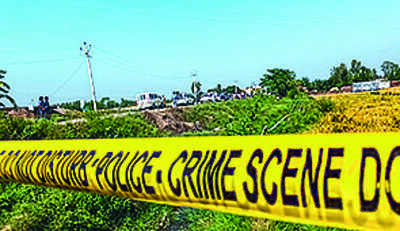Top Searches
- News
- India News
- Hundreds at Kheri rally, why only 23 eyewitnesses: SC
Hundreds at Kheri rally, why only 23 eyewitnesses: SC
Hundreds at Kheri rally, why only 23 eyewitnesses: SC

At Lakhimpur Kheri (File photo)
NEW DELHI: The Supreme Court on Tuesday questioned UP Police on why there were only 23 eyewitnesses in the Lakhimpur Kheri violence case when hundreds of people were present at the rally and also directed the UP government to provide protection to all of them.
A bench of Chief Justice N V Ramana and Justices Surya Kant and Hima Kohli asked the state to record the statements of other witnesses before judicial magistrates and expedite the examination of digital evidence. It directed the state to file a separate status report on the death of a journalist and that of BJP worker Shyam Sunder, who was attacked by a mob of farmers.
The court also asked the state to speed up the process of getting laboratory reports and also the recording of statements of eyewitnesses.
As senior advocate Harish Salve, appearing for the UP government, informed the bench that there are 68 witnesses in the case and statements of 30 (of whom 23 are eyewitnesses) have been recorded, the bench questioned why the number of eyewitnesses is "so low" as there were hundreds of farmers at the rally. "There was a crowd of 4,000-5,000 people who were all local people and even post-incident most of them were agitating. Then the identification of these people should not be a problem," the bench said.
The bench also emphasised that eyewitness evidence is always more credible. "It is always better that first-hand information and evidence is available. It is always better to have credible evidence," it said. Salve said the first ring of people close to the scene of the incident and those who saw the cars and people inside these vehicles were among the eyewitnesses.
The court after perusing the report said that it is concerned about two issues - one is about the delay in getting all the reports by the state government from forensic laboratories and the second is that of protection of witnesses.
It thereafter directed the state to make a request to the concerned forensic laboratories to provide all the reports to it as early as possible and also provide protection to all the witnesses. "...we further direct the state government to expedite the recording of statements of some more witnesses under Section 164 of the Code of Criminal Procedure, 1973, who are relevant to be enquired about the alleged incident. If the state government feels any difficulty due to non-availability of judicial officers, we direct the concerned district judge to entrust this task of recording of statements of these witnesses to any nearest magistrate," the bench said.
A bench of Chief Justice N V Ramana and Justices Surya Kant and Hima Kohli asked the state to record the statements of other witnesses before judicial magistrates and expedite the examination of digital evidence. It directed the state to file a separate status report on the death of a journalist and that of BJP worker Shyam Sunder, who was attacked by a mob of farmers.
The court also asked the state to speed up the process of getting laboratory reports and also the recording of statements of eyewitnesses.
As senior advocate Harish Salve, appearing for the UP government, informed the bench that there are 68 witnesses in the case and statements of 30 (of whom 23 are eyewitnesses) have been recorded, the bench questioned why the number of eyewitnesses is "so low" as there were hundreds of farmers at the rally. "There was a crowd of 4,000-5,000 people who were all local people and even post-incident most of them were agitating. Then the identification of these people should not be a problem," the bench said.
The bench also emphasised that eyewitness evidence is always more credible. "It is always better that first-hand information and evidence is available. It is always better to have credible evidence," it said. Salve said the first ring of people close to the scene of the incident and those who saw the cars and people inside these vehicles were among the eyewitnesses.
The court after perusing the report said that it is concerned about two issues - one is about the delay in getting all the reports by the state government from forensic laboratories and the second is that of protection of witnesses.
It thereafter directed the state to make a request to the concerned forensic laboratories to provide all the reports to it as early as possible and also provide protection to all the witnesses. "...we further direct the state government to expedite the recording of statements of some more witnesses under Section 164 of the Code of Criminal Procedure, 1973, who are relevant to be enquired about the alleged incident. If the state government feels any difficulty due to non-availability of judicial officers, we direct the concerned district judge to entrust this task of recording of statements of these witnesses to any nearest magistrate," the bench said.
FacebookTwitterLinkedinEMail
Start a Conversation
end of article
Quick Links
Coronavirus in MumbaiFarm bill 2020Farmers protestCoronavirus in DelhiCoronavirus in BangaloreCoronavirus symptomsCoronavirus in IndiaWest Bengal elections 2021Coronavirus NewsSolar EclipseNPRWhat is NRCCAB BillCAB and NRCAssam election 2021Podcast newsLok SabhaTamil Nadu Election 2021CongressBJP newsKerala Elections 2021Indian ArmyISRO newsSupreme Court

